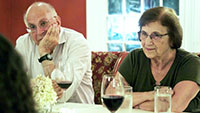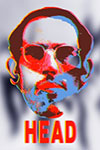In July, 2013, Edge invited a group of social scientists to participate in an Edge Seminar at Eastover Farm focusing on the state of the art of what the social sciences have to tell us about human nature. The ten speakers were Sendhil Mullainathan, June Gruber, Fiery Cushman, Rob Kurzban, Nicholas Christakis, Joshua Greene, Laurie Santos, Joshua Knobe, David Pizarro, Daniel C. Dennett. Also participating were Daniel Kahneman, Anne Treisman, Jennifer Jacquet.
We asked the participants to consider the following questions:
"What's new in your field of social science in the last year or two, and why should we care?" "Why do we want or need to know about it?" "How does it change our view of human nature?"
And in so doing we also asked them to focus broadly and address the major developments in their field (including but not limited to their own research agenda). The goal: to get new, fresh, and original up-to-date field reports on different areas of social science.
What Big Data Means For Social Science (Sendhil Mullainathan) | The Scientific Study of Positive Emotion (June Gruber) | The Paradox of Automatic Planning (Fiery Cushman) | P-Hacking and the Replication Crisis (Rob Kurzban) | The Science of Social Connections (Nicholas Christakis) | The Role of Brain Imaging in Social Science (Joshua Greene) | What Makes Humans Unique (Laurie Santos) | Experimental Philosophy and the Notion of the Self (Joshua Knobe) | The Failure of Social and Moral Intuitions (David Pizarro) | The De-Darwinizing of Cultural Change (Daniel C. Dennett)
HeadCon '13: WHAT'S NEW IN SOCIAL SCIENCE was also an experiment in online video designed to capture the dynamic of an Edge seminar, focusing on the interaction of ideas, and of people. The documentary film-maker Jason Wishnow, the pioneer of "TED Talks" during his tenure as director of film and video at TED (2006-2012), helped us develop this new iteration of Edge Video, filming the ten sessions in split-screen with five cameras, presenting each speaker and the surrounding participants from multiple simultaneous camera perspectives.
We are now pleased to present the program in its entirety, nearly six hours of Edge Video and a downloadable PDF of the 58,000-word transcript.
The great biologist Ernst Mayr (the "Darwin of the 20th Century") once said to me: "Edge is a conversation." And like any conversation, it is evolving. And what a conversation it is!

(6 hours of video; 58,000 words)
John Brockman, Editor
Russell Weinberger, Associate Publisher

Download PDF of Manuscript | Continue to Video and Online Text
Sendhil Mullainathan: What Big Data Means For Social Science (Part I)
We've known big data has had big impacts in business, and in lots of prediction tasks. I want to understand, what does big data mean for what we do for science? Specifically, I want to think about the following context: You have a scientist who has a hypothesis that they would like to test, and I want to think about how the testing of that hypothesis might change as data gets bigger and bigger. So that's going to be the rule of the game. Scientists start with a hypothesis and they want to test it; what's going to happen?
June Gruber: The Scientific Study of Positive Emotion (Part II)
What I'm really interested in is the science of human emotion. In particular, what's captivated my field and my interest the most is trying to understand positive emotions. Not only the ways in which perhaps we think they're beneficial for us or confer some sort of adaptive value, but actually the ways in which they may signal dysfunction and may not actually, in all circumstances and in all intensities, be good for us.
June Gruber is Assistant Professor of Psychology, Director, Positive Emotion & Psychopatology Lab, Yale University.
Fiery Cushman: The Paradox of Automatic Planning (Part III)
I want to tell you about a problem that I have because it highlights a deep problem for the field of psychology. The problem is that every time I sit down to try to write a manuscript I end up eating Ben and Jerry's instead. I sit down and then a voice comes into my head and it says, "How about Ben and Jerry's? You deserve it. You've been working hard for almost ten minutes now." Before I know it, I'm on the way out the door.
Fiery Cushman is Assistant Professor, Cognitive, Linguistic, Social Science, Brown University.
Rob Kurzban: P-Hacking and the Replication Crisis (Part IV)
The first three talks this morning I think have been optimistic. We've heard about the promise of big data, we've heard about advances in emotions, and we've just heard from Fiery, who very cleverly managed to find a way to leave before I gave my remarks about how we're understanding something deep about human nature. I think there's a risk that my remarks are going to be understood as pessimistic but they're really not. My optimism is embodied in the notion that what we're doing here is important and we can do it better.
Rob Kurzban is an Associate Professor, University of Pennsylvania specializing in evolutionary psychology: Author, Why Everyone (Else) Is A Hypocrite.
Nicholas Christakis: The Science of Social Connections (Part V)
If you think about it, humans are extremely unusual as a species in that we form long-term, non-reproductive unions to other members of our species, namely, we have friends. Why do we do this? Why do we have friends? It's not hard to construct an argument as to why we would have sex with other people but it's rather more difficult to construct an argument as to why we would befriend other people. Yet we and very few other species do this thing. So I'd like to problematize that, I'd like to problematize friendship first.
Nicholas Christakis is a Physician and Social Scientist; Director, The Human Nature Lab, Yale University; Coauthor, Connected: The Surprising Power Of Our Social Networks And How They Shape Our Lives.
Joshua Greene: The Role of Brain Imaging in Social Science (Part VI)
We're here in early September 2013 and the topic that's on everybody's minds, (not just here but everywhere) is Syria. Will the U.S. bomb Syria? Should the U.S. bomb Syria? Why do some people think that the U.S. should? Why do other people think that the U.S. shouldn't? These are the kinds of questions that occupy us every day. This is a big national and global issue, sometimes it's personal issues, and these are the kinds of questions that social science tries to answer.
Joshua Greene is John and Ruth Hazel Associate Professor of the Social Sciences and the director of the Moral Cognition Laboratory in the Department of Psychology, Harvard University. Author, Moral Tribes: Emotion, Reason, And The Gap Between Us And Them.
Laurie Santos: What Makes Humans Unique (Part VII)
The findings in comparative cognition I'm going to talk about are often different than the ones you hear comparative cognitive researchers typically talking about. Usually when somebody up here is talking about how animals are redefining human nature, it's cases where we're seeing animals being really similar to humans—elephants who do mirror self-recognition; rodents who have empathy; capuchin monkeys who obey prospect theory—all these cases where we see animals doing something really similar.
Laurie Santos is Associate Professor, Department of Psychology; Director, Comparative Cognition Laboratory, Yale University.
Joshua Knobe: Experimental Philosophy and the Notion of the Self (Part VIII)

What is the field of experimental philosophy? Experimental philosophy is a relatively new field—one that just cropped up around the past ten years or so, and it's an interdisciplinary field, uniting ideas from philosophy and psychology. In particular, what experimental philosophers tend to do is to go after questions that are traditionally associated with philosophy but to go after them using the methods that have been traditionally associated with psychology.
Joshua Knobe is an Experimental Philosopher; Associate Professor of Philosophy and Cognitive Science, Yale University.
We had people interact—strangers interact in the lab—and we filmed them, and we got the cues that seemed to indicate that somebody's going to be either more cooperative or less cooperative. But the fun part of this study was that for the second part we got those cues and we programmed a robot—Nexi the robot, from the lab of Cynthia Breazeal at MIT—to emulate, in one condition, those non-verbal gestures. So what I'm talking about today is not about the results of that study, but rather what was interesting about looking at people interacting with the robot.
David Pizarro is Associate Professor of Psychology, Cornell University, specializing in moral judgement.
Daniel C. Dennett: The De-Darwinizing of Cultural Change (Part X)
Think for a moment about a termite colony or an ant colony—amazingly competent in many ways, we can do all sorts of things, treat the whole entity as a sort of cognitive agent and it accomplishes all sorts of quite impressive behavior. But if I ask you, "What is it like to be a termite colony?" most people would say, "It's not like anything." Well, now let's look at a brain, let's look at a human brain—100 billion neurons, roughly speaking, and each one of them is dumber than a termite and they're all sort of semi-independent. If you stop and think about it, they're all direct descendants of free-swimming unicellular organisms that fended for themselves for a billion years on their own. There's a lot of competence, a lot of can-do in their background, in their ancestry. Now they're trapped in the skull and they may well have agendas of their own; they have competences of their own, no two are alike. Now the question is, how is a brain inside a head any more integrated, any more capable of there being something that it's like to be that than a termite colony? What can we do with our brains that the termite colony couldn't do or maybe that many animals couldn't do?
Daniel C. Dennett is a Philosopher; Austin B. Fletcher Professor of Philosophy, Co-Director, Center for Cognitive Studies, Tufts University; Author, Intuition Pumps.
ALSO PARTICIPATING

Daniel Kahneman is Recipient, Nobel Prize in Economics, 2002; Presidential Medal of Freedom, 2013; Eugene Higgins Professor of Psychology, Princeton University; Author, Thinking Fast And Slow. Anne Treisman is Professor Emeritus of Psychology, Princeton University; Recipient, National Medal of Science, 2013.

Jennifer Jacquet is Clinical Assistant Professor of Environmental Studies, NYU; Researching cooperation and the tragedy of the commons.
Out-take from the trailer I made for the 1968 movie "Head" (Columbia Pictures; Directed by Bob Rafelson; Written by Jack Nicholson)













